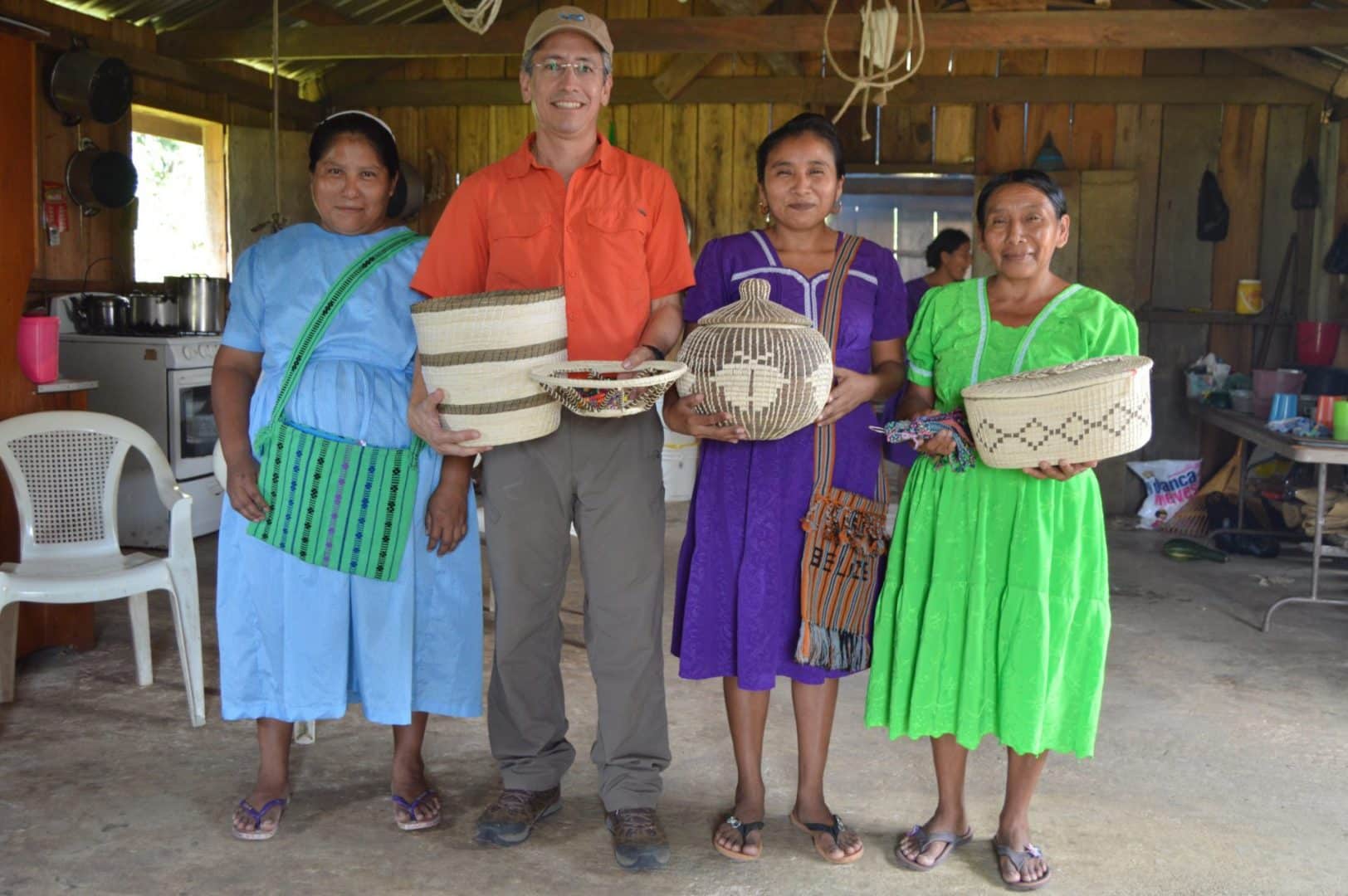Case Study: Developing Vital Skills for Sustainable Agriculture and Livelihoods in Central America
Introduction
The Central American region of El Salvador, Guatemala, and Honduras, known as the Northern Triangle, is one of the poorest in the Western Hemisphere.1 In recent years, the region has suffered environmental crises, including damage to critical crops,2 and a series of destructive hurricanes which have further challenged its social and economic stability. Because agriculture is one of the most accessible sources of income in the region, investments in the sector are vital to improve living standards and help curb irregular migration caused by poverty.3
Through a grant funded by Walmart Foundation, Tandem Global has delivered on-the-ground programming in the Northern Triangle designed to upskill local farmers and improve their economic opportunities while positively impacting sustainable agricultural practices and the global supply chain.
Program Details and Impact
Program Details: Phase One
Beginning in 2021, the World Environment Center (now Tandem Global) began the first phase of a multi-year effort to support farmers, producer organizations, and Micro, Small, and Medium Enterprises (MSMEs) in the Northern Triangle.
The focus of the first phase of the effort was in five areas:
- Market Opportunity Assessment
- Adjacent Program Linkages
- Deep Skills Development, Training, and Support to Farmers, Producer Organizations, and MSMEs
- Digital Tools Development and Dissemination
- Development and Documentation of Sustainable and Scalable Solutions to Support Access to Markets
Across these areas, Tandem Global and its multidisciplinary team of experts developed and implemented a comprehensive technical assistance program. The program strengthened competencies and skills, and helped implement new technologies and procedures to achieve more sustainable agricultural businesses. Examples of critical knowledge transfer included:
- Techniques to produce crops under hydroponic systems
- Construction of protected production systems (greenhouses, net houses, macro tunnels)
- Training in the use of drip irrigation systems for vegetable production
Additionally, the program provided training in the development of entrepreneurial and business management skills. This helped trainees better understand market access principles and what would be necessary to create integration into new supply chains and markets, including how to:
- Implement best agricultural practices (BPA’s)
- Develop planting plans and crop diversification programs
- Participate in regional business events
- Develop business plans
- Access non-reimbursable funds and financing
- Plan for the purchase of supplies and for the collective purchase of supplies
Phase One Impact
- 3,000 hours of technical assistance were provided
- 1,895 farmers received agricultural productivity and/or food security training
- 1,391 farmers (278 female), 60 technicians, and 6 tractor companies implemented new practices and technologies
- 602 hectares were placed under better management practices
- 26 producer organizations and MSMEs increased their market linkages domestically and internationally
- Support was provided to access $300,000 in financing and non-reimbursable funds for the construction of protected agriculture systems (greenhouses, net houses, macro tunnels) and hydroponic systems in Honduras and El Salvador
- Production of a digital toolkit (web and mobile versions) was completed to capture the main contents of the technical assistance provided, allowing farmers to access relevant information on products, prices, and how to connect with potential customers, and the creation of a mobile app to foster exchanges between producers and buyers
- 1,391 individuals used the toolkit
- 170 individuals used the app
Program Details: Phase Two
The second phase of the effort continued with a focus on formal and informal training with a particular emphasis on:
- Implementing biotechnologies to increase farm resiliency
- Attaining certifications and seals as ways to increase access to markets
- Collaborating with public and private organizations on ways to strengthen farmer, producer organization, and MSME participation in the agriculture value chain
- Scaling the use of the digital app developed in phase one
- Strengthening the participation of women and youth in successful agricultural businesses to help break the cycle of poverty
To deliver impact in these focus areas, the Tandem Global team and its on-the-ground partners:
- Raised awareness of the importance of strategic alliances to gather feedback about key groups to be supported, like women and youth, and to include allied organizations in providing technical assistance to help ensure the future sustainability of the program. This approach promoted long-term knowledge transfer on:
- Capacity building in sustainable food production
- The economic, environmental, and health and safety relevance of implementing sustainable and responsible practices
- The benefit of involving suppliers and clients to help raise social and environmental awareness in the entire value chain
- Focused efforts on the production and use of better technologies such as:
- Making bio-supplies available in beneficiaries’ farms
- Creating demonstration plots as a sustainable and more organic way of production at micro and small scale
- Launching an upgraded version of the phase one digital platform with relevant information such as bio-supplies manuals and new technical guides, and procedures
- Ensured beneficiary support for implementing improvements to meet the requirements established by local regulations and markets to obtain certification in quality/safety, environment, social, or regulatory compliance.
Phase Two Impact
- 284 female beneficiaries participated in technical assistance and training sessions
- 9 women obtained a 6-month internship on financial and entrepreneurial skills
- More than 300 hours of training were provided to 500+ beneficiaries, on topics such as:
- Organic and microbiological alternatives for agriculture
- Use of commercial biological and organic products for phytosanitary management of soil and foliage
- Production of organic fertilizers and their use on soil and foliage
- Demonstration plots substituted the use of agrochemicals partially or totally to reduce production costs, improve soil quality, protect workers’ health, and obtain healthier products for consumers. which achieved:
- 8% increase in yield per unit of production
- 9% reduction in production costs
- 13% increase in the net profit margin
- Elimination of the use of agrochemicals and/or conventional pesticides
- 50% reduction in the application of synthetic nitrogen fertilizers
Program Details: Phase Three
The efforts of phases 1 and 2 increased the adoption of effective agricultural best practices and technologies, which helped increase production yields and incomes. Because of these successes, it became more important to extend the knowledge and capacity-building elements of the program to create opportunities for more farmers in rural areas to obtain sufficient incomes. Doing so not only supports the sustainability of the environment in more places but may also lead to a reduction in the migration crisis that has continued to expand in the Northern Territory region.
As a result, the final phase of programming addressed:
- Improving the economic ecosystem to strengthen the businesses of small farmers. Efforts focused on expanding and/or creating new alliances with public and private organizations and increasing the number of ally organizations providing training and mentoring to farmers to strengthen capacity and create market opportunities.
- Implementing innovative technological packages to improve the sustainability of agrobusinesses, helping them be more resilient to market and environmental challenges. Follow-up of previous experiences was conducted to ensure continuity of improvements and that successful practices were expanded into new sectors and among new beneficiaries.
- Increasing the participation of small farmers in better and/or new market niches by developing action plans and coordinating with local organizations, to integrate formal documentation into operations to access better markets.
Phase Three Impact
Early phase three successes (through December 2024) have included:
- 13 private and government organizations actively supporting program beneficiaries
- Technicians provided more than 50 hours of capacity-building programs to ensure knowledge transfer, with local technicians providing ongoing technical assistance to farmers
- 828 farmers of 18 Farmer Producer Organizations (FPOs) were selected as direct program beneficiaries
- 2 new sectors, coffee and basic grains, were added along with 13 new beneficiary FPOs, broadening the program’s impact across diverse agricultural contexts. The program involves managing 174 hectares of coffee, 29 hectares of vegetables, 14 hectares of basic grains, and 10 hectares of fruit trees
Elements of Success and What’s Next
While formal program implementation ends in 2025, Tandem Global has identified several elements that will create a self-sustaining framework that supports continuous growth and resilience among farmers and local organizations long after the program concludes.
- The current program implementation model works. Empowering beneficiaries and local allies with essential technical knowledge and skills creates a foundation for continued growth and independence.
- Maintaining ongoing monitoring and evaluation matters. A structured follow-up plan is in place to assess the effectiveness of technical assistance and technology transfer sessions. This process verifies that practices shared with farmers and others are not only received but also adopted and replicated within their organizations.
- Partnerships and collaborative efforts can always be strengthened. Tandem Global aims to continuously develop the capacities of local organizations that can sustain support for farmers and farmer groups. Partnerships with both public and private entities are essential to ensure ongoing program engagement and the sustainability of outcomes.
- Systematizing activities is vital. All activities and results across program components should be systematically documented on a digital platform. Doing so can provide users with access to guides, manuals, procedures, agricultural management plans, and other resources that will support improved farm management practices.
1Central America’s Turbulent Northern Triangle | Council on Foreign Relations.
2Insight: Coffee crisis in Central America fuels record exodus north | Reuters

